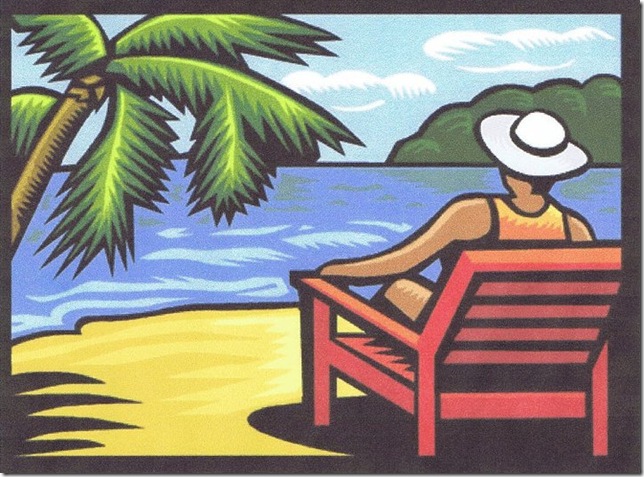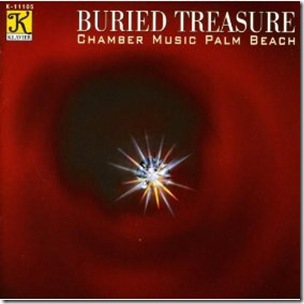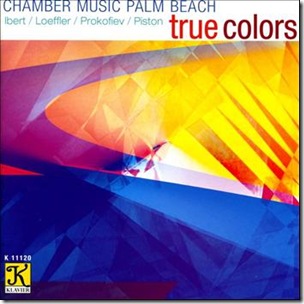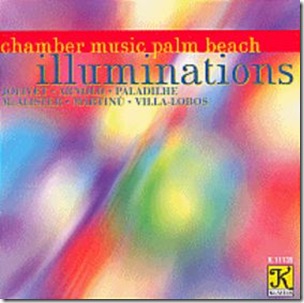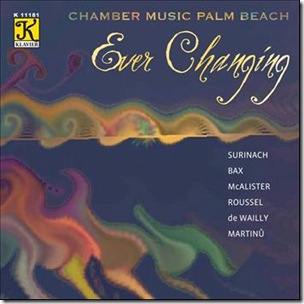The 21st edition of the Palm Beach Chamber Music Festival opens Friday night at the Persson Recital Hall on the campus of Palm Beach Atlantic University, and with its arrival we can say that the summer season in South Florida is truly in full swing.
This year’s four programs feature some discoveries, including rare works by Alexandre Tansman (Septet for trumpet, viola and cello, Week 1) Vincent d’Indy (Suite in the Ancient Style, for two flutes, trumpet and string quintet; week 3) and Edward Elgar (Six Promenades for woodwinds, also Week 3), as well as a sextet by Carl Reinecke and a divertimento by the early Romantic Italian violinist and composer Alessandro Rolla (both in Week 4).
Music of the film composer Nino Rota (a flute, violin and piano trio in Week 2) is scheduled, as is music by Mel Powell (Divertissement, also Week 2), Morton Gould (Benny’s Gig for clarinet and double bass, Week 1) and Bela Bartok (Contrasts, Week 3). The great G minor String Quintet (K. 516) of Mozart is the final work on the Week 2 programs, Brahms’ First Piano Quartet (in G minor, Op. 25) closes Week 4, and the chamber song Der Hirt auf dem Felsen (The Shepherd on the Rock, D. 965) of Schubert, sung by mezzo Sonia Santiago, opens Week 2.
The founders of the festival – clarinetist Michael Forte, flutist Karen Dixon and bassoonist Michael Ellert – are considering offering some chamber concerts in the early part of the season (October or November), and there will be an appearance at the first concert by an amateur musician (clarinetist David Hinds, who will be heard in one movement from the Mozart Kegelstatt Trio) who is hoping that the festival will initiate a program for similar part-time musicians who want to participate in chamber music.
Details are available at the bottom of this piece, and on the festival’s website (www.pbcmf.org), but this year I want to take a closer look at what is arguably the series’ greatest legacy outside of carrying the culture torch for music-lovers during the summer, and that is the six recordings the group has issued since 2000.
All of the discs appeared on the Klavier label, based in Boca Raton, which specializes in symphonic band music. Each of the discs was produced by Clark McAlister, whose pieces for the group appear on five of the six records. The recording, editing and mastering was done by Los Angeles-based Bruce Leek, and he has done a wonderful job: The sound is rich and deep, with an immediacy of presence that allows you to hear every part of the sonic texture,
Many of the works on this disc have been recorded infrequently or never committed to disc before, and they constitute a treasure trove of worthy music that needs to be more diligently explored by the nation’s chamber ensembles. In particular, these records make a compelling case for the chamber music of Bohuslav Martinů and Albert Roussel, and for neglected American music as well.
Here is a brief look at the discs, with a note about my favorite piece on each of them:
Buried Treasure (2000): Music by Poulenc, Randall Thompson, Nielsen, Joaquin Turina, Robert Muczynski, Lalo, Alan Hovhaness and McAlister.
The Nielsen ― Serenata Invano, for clarinet, horn, bassoon, cello and bass ― is a marvelously quirky piece by a first-rate composer, and McAlister’s Lou’s Mountain Bread, a clever, expertly written take on American folksongs for nonet, is one of his most immediately appealing pieces. My favorite here is the Suite for oboe, clarinet and viola of Thompson, a composer known these days primarily for the short choral Alleluia that has opened all the Tanglewood seasons for decades. But this five-movement Suite, written in 1940, is a scrumptious and beautiful piece of distilled Americana, nicely played by Forte, oboist Kelly Peterson Peral and violist Elizabeth Derderian-Wood.
True Colors (2002): Music by Gustave Samazeuilh, Charles Martin Loeffler, Jacques Ibert, Prokofiev, Martinů and Walter Piston.
Loeffler’s Ballade Carnavalesque, written for flute, oboe, alto sax, bassoon and piano, and Samazeuilh’s Divertissement et Musette (for woodwind quintet and string quartet) get their first recordings here, and while the Loeffler is much more sophisticated than the work of his fellow Frenchman, the short, sweet Samazeuilh has much to recommend it in terms of pretty tunesmithing and clarity of expression. Martinů’s Serenata II for two violins and viola boasts a gorgeous slow movement, and the Prokofiev Quintet (Op. 39, for oboe, clarinet, violin, viola and bass) gets a committed, powerful performance. But pride of place goes to the Divertimento for nonet of Walter Piston, composed in 1946. A warm-hearted, attractive work in three movements, it is a fine example of this important American composer’s spotless craft.
Illuminations (2003): Music by Villa-Lobos, Andre Jolivet, Malcolm Arnold, McAlister, Emile Paladilhe and Martinů.
Another forgotten Frenchman, Emile Paladilhe, gets an outing with his pretty Danse Noble for string trio, played with full-on sentiment here by violinist Mei Mei Luo, violist James Griffith and cellist Susan Moyer (now Bergeron). Dixon, Ellert and harpist Kay Kemper provide austerely beautiful Christmas music with Jolivet’s Pastorales de Noël, and Griffith joins the two for a delightful, impish early Trio (Op. 6) by the British composer Malcolm Arnold. It’s a tossup here between the Nonet of Martinů (written in 1959, the year he died), and the Chôros No. 7 (for wind quartet, alto sax, violin, cello and tam-tam) of Heitor Villa-Lobos. The Martinů is a forthright, endearing piece of consummate mastery, while the Chôros has all the hallmarks of the prolific Brazilian’s eclecticism, which leads here in unexpected, exciting directions.
Prisms (2004): Music by Irving Fine, Amy Beach, Milhaud, Griffes, McAlister, Roussel and Gabriel Pierné.
This is the most American disc of the six, with four of the seven pieces by U.S. composers, the other three by Frenchmen. The older American works should be in the standard repertory of chamber ensembles in this country, as this disc persuasively demonstrates, starting with Irving Fine’s One, Two, Buckle My Shoe, a quartet for flute, clarinet, violin and cello originally composed for a shoe company documentary in 1959; Dixon, Forte, violinist Dina Kostic and cellist Moyer play this terrific little piece with athletic good spirits. Amy Beach’s Theme and Variations (Op. 80) for flute and string quartet is a major work from 1919, with a beautiful theme and a brilliant set of variations, and Charles Griffes’ Two Sketches Based on Indian Themes for string quartet, written the year before, use their modal source material masterfully, in the first sketch for a haunting, gorgeous song, and in the second for a cannily varied rhythmic exercise with an irresistible drive. The players ― Luo, Kostic, violist Rene Reder and Moyer― give it a wonderful, committed reading.
Summer Travels (2006): Music by Duruflé, McAlister, Holst, Massenet, Lalo, Frank Bridge and André Caplet.
The Caplet work, Legende, an octet for oboe, clarinet, bassoon, alto sax, string trio and bass, is a welcome addition to the repertory from this friend of Debussy (who orchestrated for him as well), and the two British pieces ― Gustav Holst’s Terzetto, with each part in a different key, and Bridge’s Divertimenti for wind quartet ― are splendid examples of their composers’ formidable level of compositional chops. But the palm goes here to Maurice Duruflé’s very early Prélude, Recitatif et Variations (Op. 3) for flute, viola and piano, given a marvelous performance by Dixon, Reder and pianist Lisa Leonard. It’s a shame Duruflé wrote so few chamber works, because this is a masterpiece of French chamber writing – elegant, lovely and sparkling in equal turns ― that should be competing with Fauré for equal time.
Ever Changing (2010): Music by Carlos Surinach, Arnold Bax, McAlister, Roussel, Paul de Wailly, and Martinů.
The Ritmo Jondo of the once-popular, now-forgotten Spanish-American composer Surinach, written for trumpet, clarinet, timpani, percussion and hand-clapping, is the most unusual piece on these records, and it has the considerable merit of being brief but hugely effective and sonically novel. The French composer Paul de Wailly’s Aubade for flute, clarinet and oboe is a delightful miniature with a bubbling, Mendelssohnian opening, and McAlister’s Agreste, for wind quintet, string quartet and bass, has an engaging geniality that makes it fit well with the rest of the pieces on this disc. Martinů’s Trio for flute, cello and piano, with its intense slow movement, and Roussel’s Trio in F (Op. 40) for flute, viola and cello, with its inventive and witty finale, should be heard much more often. The same goes for the standout piece here, Arnold Bax’s Oboe Quintet, in which oboist Sherie Aguirre is the splendid soloist, accompanied ably by Luo, Kostic, Reder and Moyer. The finale in particular, which sounds almost as though it’s going into I’ve Got Plenty o’ Nuttin’ (though it’s 10 years older than the Gershwin), has an over-the-hills-and-dales main theme that turns intense and complicated. It’s a fascinating piece of British chamber writing, and a good addition to the repertory for oboists.
***
The concerts for the 21st year of the chamber festival are planned for Friday through Sunday, 13-15, 20-22, and 27-29. Friday concerts are at 8 p.m. at Persson Hall; Saturday concerts begin at 8 p.m. at the Eissey Campus Theatre at Palm Beach State College in Palm Beach Gardens; Sunday concerts are scheduled for 2 p.m. at the Crest Theatre at Old School Square in Delray Beach.
Tickets are $25 per concert or $85 for all four as a subscription, and are available at the door or in advance. To order, call 800-330-6874, or send an email to info@pbcmf.org.
The festival released a video earlier this month of a rehearsal of the third movement of the Tansman Septet, which gives a good sense of the work’s Parisian flavor:
